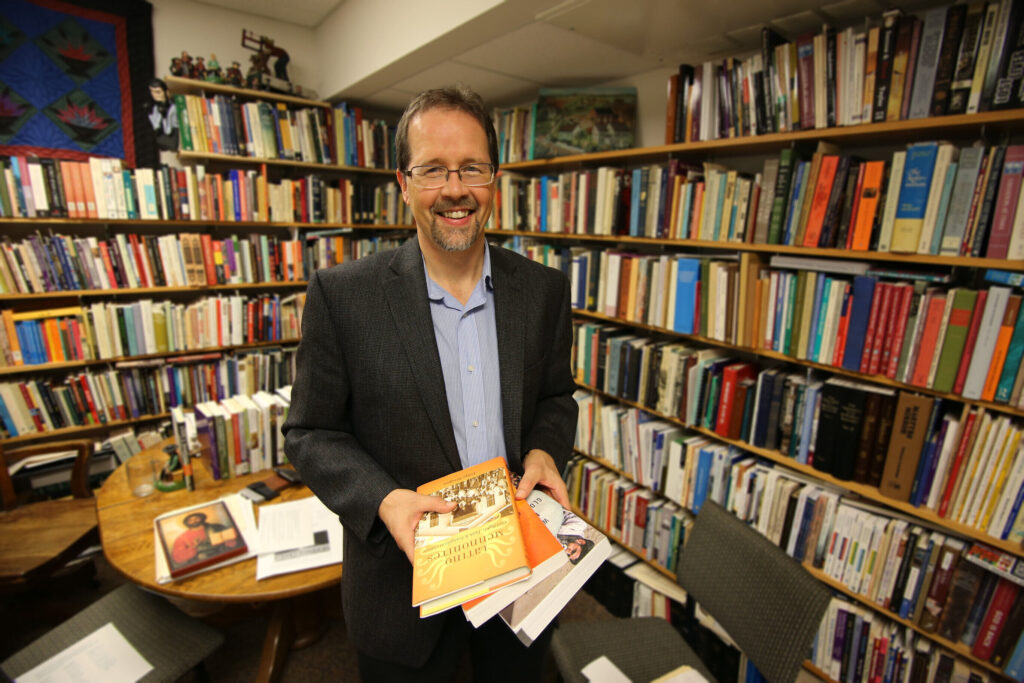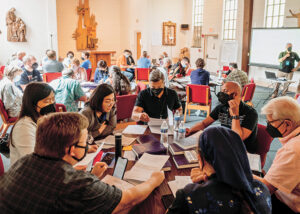Whether you’re looking for historical background for an academic paper, a church anniversary story, or to confirm a detail like “when was the Mennonite World Conference Assembly held in Curitiba, Brazil?” the Global Anabaptist Mennonite Encyclopedia Online can help you.
John Roth, the encyclopedia’s general editor, tells us more about this ever-expanding resource.
What is the Global Anabaptist Mennonite Encyclopedia Online (GAMEO)?
GAMEO is an online free encyclopedia that is probably the most authoritative source of information about Anabaptist Mennonites, Hutterites and Amish that is available on the internet.
Who started GAMEO?
GAMEO originally emerged out of a group of historians in Ontario who wanted to find a way to post information about congregational data that they had assembled. When the five-volume Mennonites encyclopedia was digitized, its 13,000 or 14,000 articles were made available online as the core of GAMEO’s first appearance on the internet.
What is Mennonite World Conference’s relationship with GAMEO?
GAMEO has an official relationship with MWC through the Faith and Life Commission.
This is intended to be a global Anabaptist Mennonite encyclopedia. We hope that with the strong connection with MWC, we will have more avenues for adding articles that reflect the breadth of our global communion today.
MWC also serves as the financial home for GAMEO. Contributions to GAMEO are directed through MWC’s accounting process.
Who contributes the articles in GAMEO?
Theoretically, anyone can be an author for a GAMEO article. But like most encyclopedias, we have editors who look for individuals who can write out of some authority. So, articles often originate when editors request them from an individual with expertise.

How is GAMEO increasing contributions from other parts of the world?
That is our biggest challenge. We are working at that in a number of ways.
One approach is to draw on information that has already appeared in print form.
For example, we asked Francis Ojwang (editor of the recent history of the Kenyan Mennonite Church, Called Forward in Faith) to select congregations or church leaders and reframe that information into GAMEO’s template for congregational profiles or church leader profiles.
We have also been working with Rafael Zaracho and his colleagues at Instituto Bíblico Asunción (Mennonite Brethren seminary in Paraguay). We’re extracting congregational profiles from their collection of short histories of Spanish-speaking MB churches in Paraguay (Memoria Viva: Historia de las iglesias de la Convención Evangélica de Iglesias Paraguayas Hermanos Menonitas).
We’ve had workshops with international students at Anabaptist Mennonite Biblical Seminary to enable them to write biographies or profiles drawing on their own experience.
We also had workshops at a conference of international historians and archivists last summer at Goshen College with about 30 people from 12 different countries.
It has been a challenge to frame information in an encyclopedia article format. But I’m confident the only way is by working article by article, individual by individual, country by country.
We see this on a long horizon; the information will grow as people become aware of GAMEO and appreciate its value as a resource.
Could a local historian submit a history of their own church congregation or a local leader profile?
Yes. On the GAMEO homepage, you will see a “help” link in the left margin with English, German, French and Spanish. You will find instructions in those languages.
The congregational profiles and the biographical profiles are probably more accessible for a new writer, but we also invite you to look at the templates for other articles.
We are eager to hear from you if you have ideas of things to contribute.
Can your editors receive submissions in different languages?
Currently, GAMEO is primarily an English language encyclopedia with links to Google Translate. That reflects our limitations linguistically, financially and technologically.
What relationship does Anabaptist Wiki have with GAMEO?
The Anabaptist Wiki is a creation of the Institute for the Study of Global Anabaptism. It’s in close partnership with GAMEO.
A wiki opens up access to anyone who wishes to contribute something of what they know. There is [a] very low threshold for entering information.
With GAMEO, we want to make sure that whatever goes up has gone through a kind of peer review process. But we see GAMEO and the Anabaptist Wiki as fitting together. We think there should be room for both approaches.
The Anabaptist Wiki also has the Biblioteca Digital Anabautista which is a gathering of sources in Spanish that have served distance learning courses in Spanish.
What is GAMEO’s structure?
The management board is made up of five organizations or institutions that have committed financial support to GAMEO.
We are an all-volunteer organization. We make an annual appeal to colleges, universities and historical societies, asking them to make a small annual contribution to the work of GAMEO. Almost all of the money goes to support the internet site.
What article should we read?
Click “random page” on the upper left on the homepage. Take two minutes to keep clicking and see where it takes you. That should give a good flavour for the remarkable range and variety of kinds of information that you will discover on GAMEO.
Is there anything you would like to add?
Last March, there were 41,000 individual visitors to GAMEO – about 13,000 unique visitors a day. We hope that as the number of articles increases, our global reach increases.
Related stories:
Updated history of Mennonites in Canada commissioned
GAMEO to maintain its emphasis on the global church









Leave a Reply
You must be logged in to post a comment.